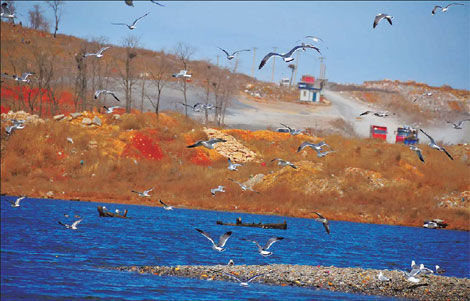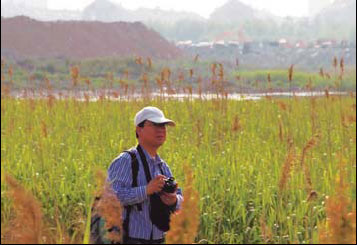Life and Leisure
Winged victims of growth
By Zhang Xiaomin (China Daily)
Updated: 2010-11-24 08:01
 |
Large Medium Small |
|
|
A patch of wetlands that lies on the route of migratory birds, near downtown Dalian, is slowly being eaten up by property development. Zhang Xiaomin reports
Xu Weiwei is a deeply worried man. And the object of his worry is the estuary wetlands near downtown Dalian, in Northeast China's Liaoning province. "Every winter, tens of thousands of birds stop over at the mouth of the Quanshui River on their migratory route. But now, property development is devouring their resting space," says 38-year-old Xu, an accountant who started a volunteers' initiative to protect the Quanshui Wetlands in 2008.
Fewer birds now stop at the once quiet wetlands, shrouded in the dust and noise kicked up by heavy trucks carrying stones to reclaim land from the sea, Xu tells China Daily.
He is strongly against the reclamation, saying wetlands are natural filters that must be protected.
They remove pollutants from water and help control floods, offer breeding and nesting areas for wildlife, and serve as migration corridors for birds, he says.
"This is an important rest area for migrating birds. They can find food here during their migration. If destroyed, the birds will have to change their migration routes," Xu continues.
Few residents in Dalian know this place, however.
Amateur photographer Luan Yuwei used to travel to East China's Shandong province to take pictures of swans.
In 2009, Luan saw a TV report that showed Xu appealing for its protection. The next day, he drove to the reed marshes.
"It was amazing. The reeds had withered but were beautiful. I had never imagined there was such an untouched wetland only a dozen kilometers north of downtown," Luan says.
"As I moved forward, I scared wild ducks, thousands of which took flight quacking above my head. I was afraid that they would lift me too."
Luan realized this was the place to photograph birds.
Unlike his first imprudent invasion, on repeat visits he would creep down into the reeds to take his pictures, trying not to disturb the birds.
Over the past year, Luan has photographed dozens of different bird species here, such as seagulls, moorhens and egrets, besides ducks.
He and other volunteers have joined Xu's efforts to protect the wetlands from being buried by villagers who are reclaiming land at Qianyan village of Ganjingzi district, Dalian.
The villagers' job has been made easy by the lack of effective administration in the area, Xu says.
"The wetlands have been seriously damaged by deforestation, illegal dumping of litter, and land reclamation, shrinking from 6 sq km to only 2 sq km in a short time," he says.
To stem this destruction, Xu put up a board by the roadside that said "Quanshui Wetland Nature Reserve" in the spring of 2010.
The volunteers also planted 500 saplings near it, but only a few have survived.
The trucks pay scant attention to the volunteers' concerns, shuttling between a nearby stone factory and the beach, to build up the embankment.
Song Zemin, an official with the Dalian Forestry Bureau, says the protection of the wetlands cannot be done without the participation of citizens.
But the villagers are determined to make their money from land compensations and are willing to sacrifice the environment.
Song suggests the government enact appropriate laws, and seek international support to protect the wetlands.
According to the draft of Dalian's wetlands protection plan, the total area under wetlands in Dalian is 408,371 hectares, accounting for 33.5 percent of the total wetlands in Liaoning province.
"Over the past decades, wetlands have become one of the most seriously threatened ecosystems around the world," Song says. "Their damage may cause irrevocable damage such as the decline of bio-diversity and sea water encroachment.
"Without the wetlands, our city will lose its vitality."
More people, including college students, are now gathering around Xu to protect the Quanshui Wetlands.
Thanks to their efforts, illegal dumping has been stopped.
In August, the municipal government brought together government departments, experts, and volunteers to discuss the future of the wetlands.
It was proposed that the 2 sq km of the wetlands be brought under protection. But the volunteers doubted its efficacy, saying a nearby forest should also be included.
"If we just protect a separated area of 2 sq km, and destroy its water-conservation forest, the wetlands will be lifeless," Xu says.
He suggests an immediate closed management of the Quanshui Wetlands. "Otherwise, the trucks will eat it up sooner or later," he says.
While Xu worries about the fate of the wetlands, his wife Jiang Hongxia worries about his safety.
"He is killing the others' goose that lays the golden egg. I'm afraid they may retaliate," she says.
But Xu says "somebody's got to do it".
"Economic development should not happen at the expense of the environment."
|
|

